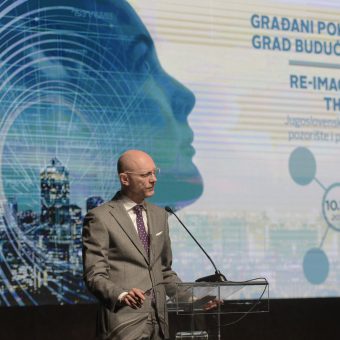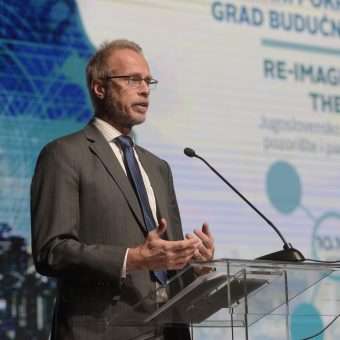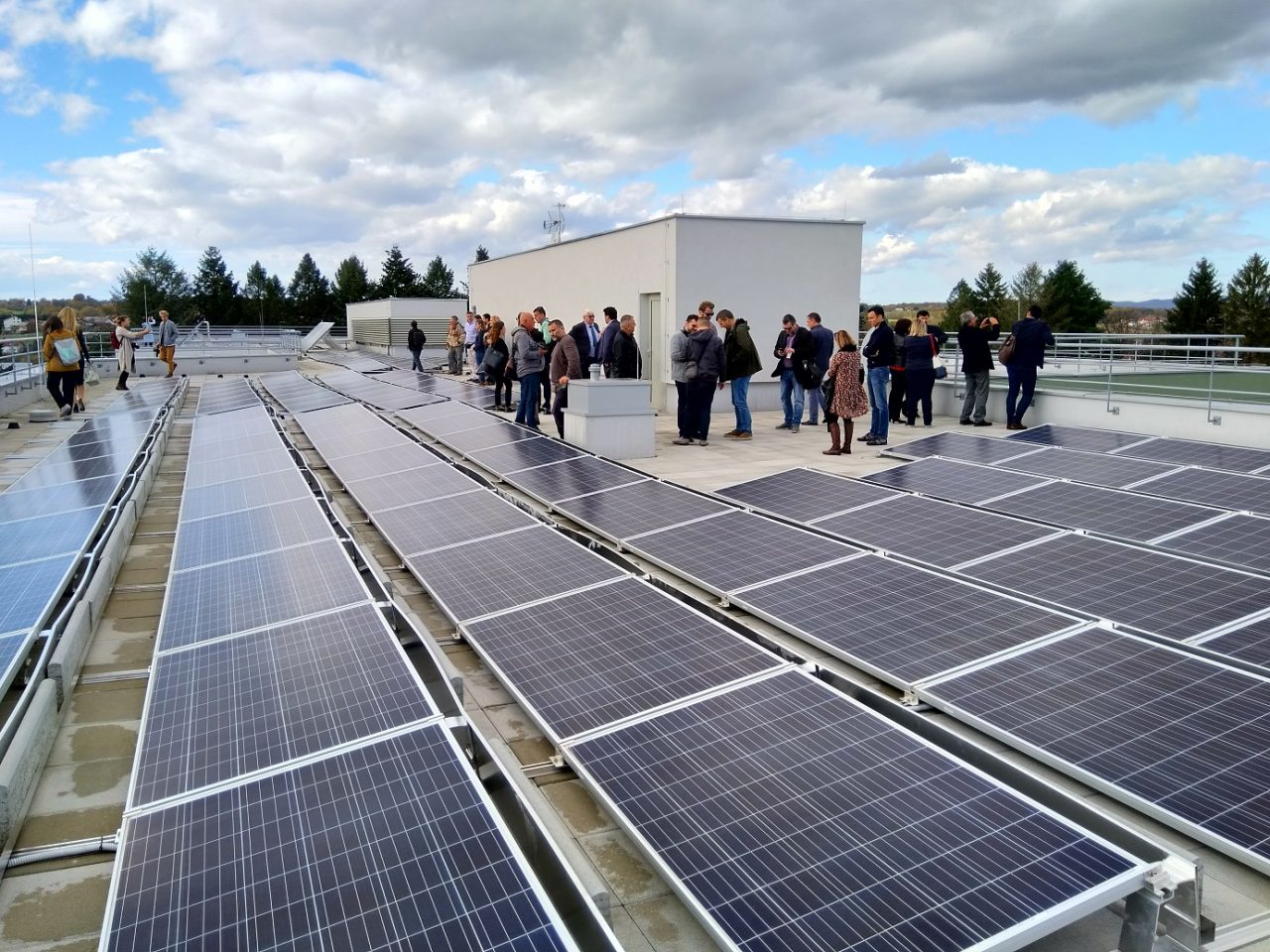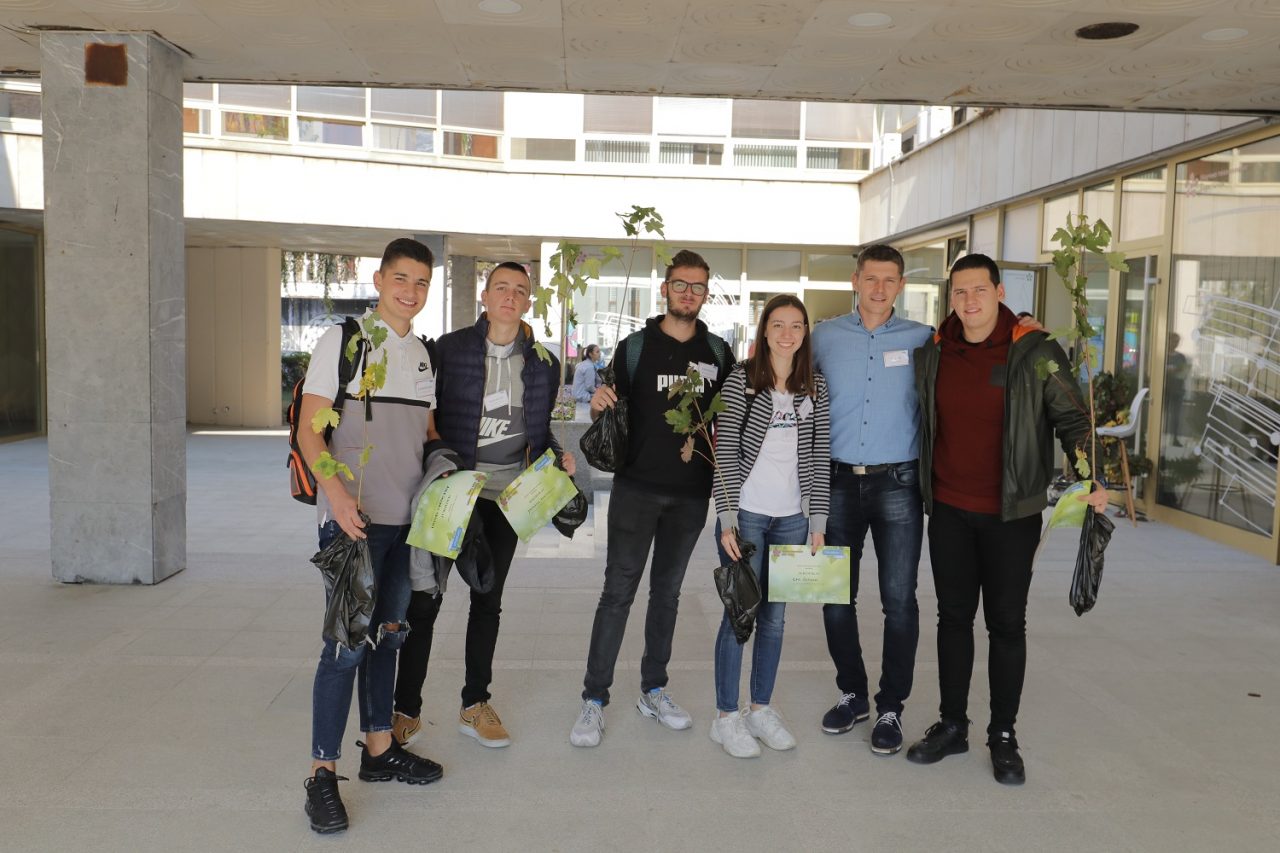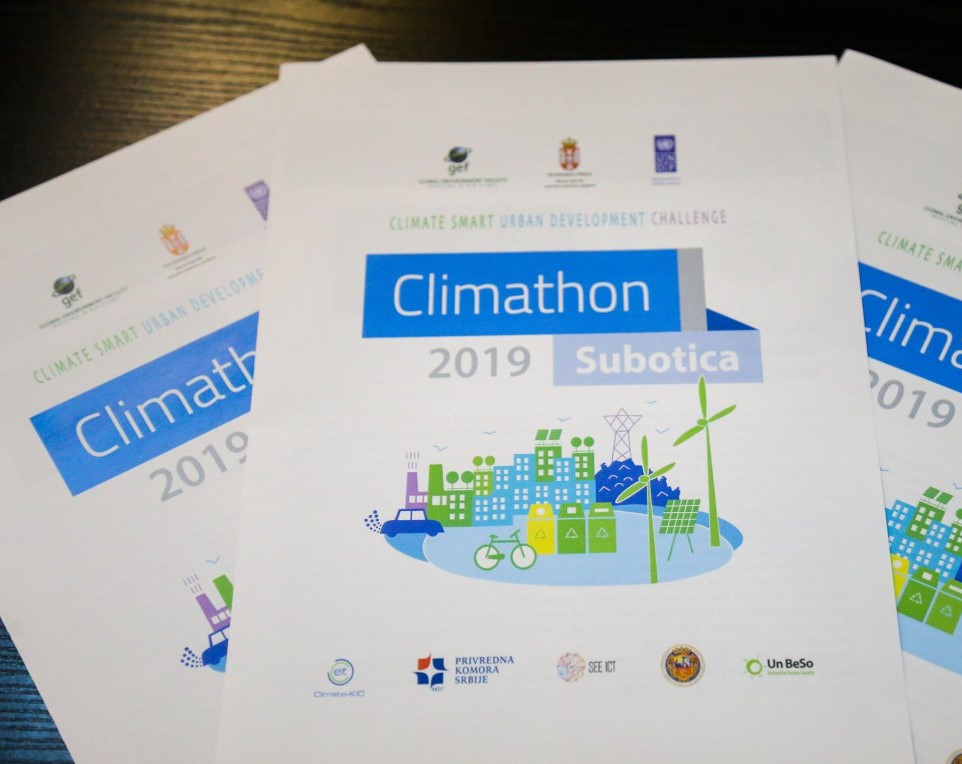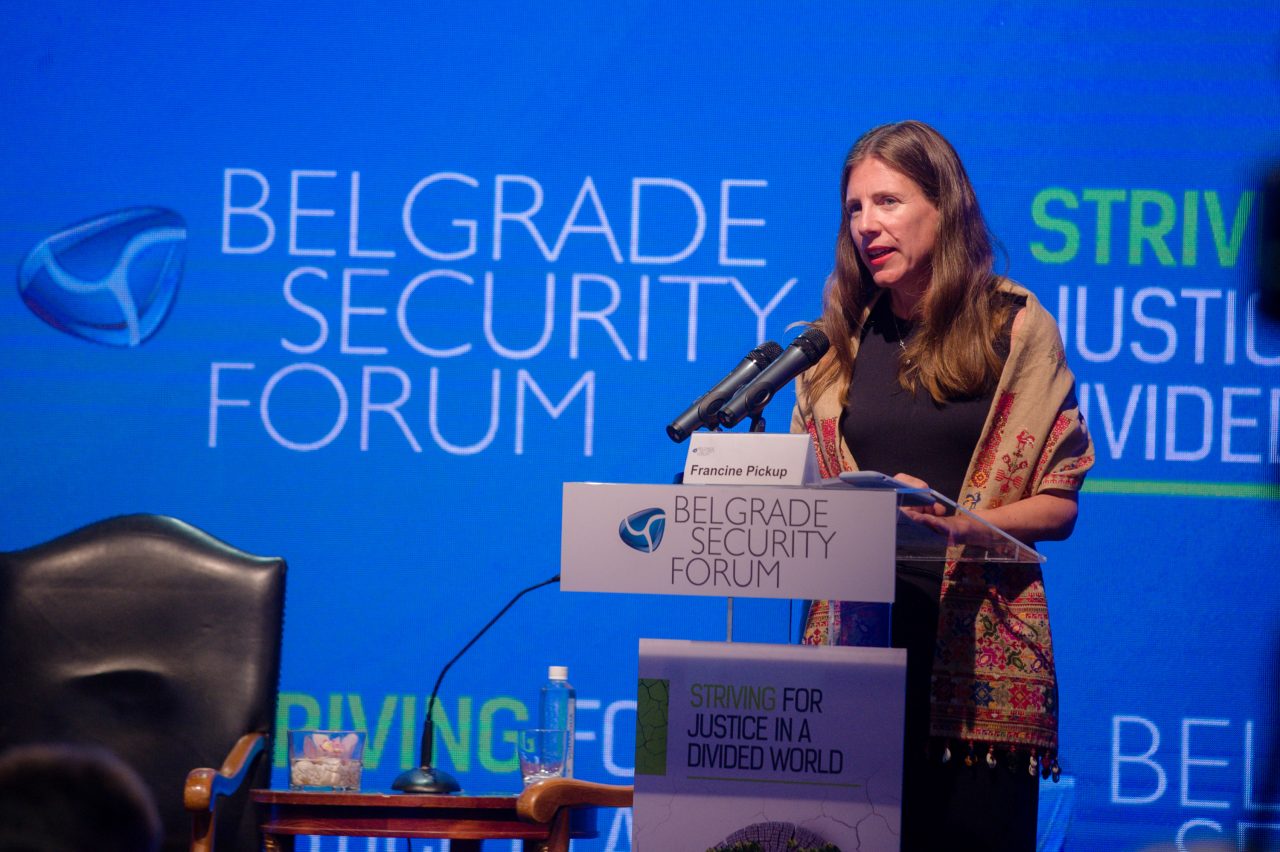-
Nov 28 2019 The First Energy Cooperative In Serbia „Sunny Roofs“ Was Founded In Šabac
The first energy cooperative in Serbia „Solar Roofs“ was founded by the citizens in Šabac on November 6th. Public Utility Company for production and distribution of thermal energy “Toplana-Šabac”, Green Energy Cooperative (ZEZ) from Zagreb and United Nations Development Programme (UNDP) in Serbia within the project “Climate Smart Urban Development Challenge” helped to establish energy cooperative.
According to the director of PUC “Toplana-Šabac” Slobodan Jerotić, similar cooperatives already exist in the countries of the European Union and the first cooperative in Serbia is open to all who are interested, regardless of the place they live.
– The initiative came from a desire to show that it is possible to bring together people of similar interests around a good idea. The main goal is to implement a project that offers an alternative solution for municipal energy supply. By using renewable energy sources, in this case, solar energy, it is possible to reduce the use of fossil fuels, heating and electricity costs, but also significantly contribute to the reduction of greenhouse gas emissions – says Jerotić.
The cooperative will soon launch an investment crowdfunding campaign for the first project, the installation of a 16.5 kilowatt solar photovoltaic power plant on the roof of the PUC “Toplana-Šabac” administrative building. The investment is estimated at 15,000 euros. Techno-economic analysis and preliminary design have been completed. An application for a construction permit has been submitted through a unified procedure under the Law on Planning and Construction.
The director of “Toplane-Šabac” announces that the first kilowatt-hours of electricity could be produced in the first quarter of 2020. The energy produced from photovoltaic power plants, installed on the roofs of private homes and public buildings, generates revenue from the sale to energy entities engaged in electricity trading or savings if used for their own needs.
We would like to hear your opinion as well. You can fill in the questionnaire (available only in the Serbian Language) about your interest to invest in the construction of a solar power plant in Šabac on the link https://eesrbija.rs/upitnik/.
-
Nov 08 2019 Smart Bag and Green Reading Room won at Climathons in Subotica and Čačak
Global climate event, dedicated to addressing the climate challenges, was held in Subotica and Čačak on 25th and 26th October.
Within 24 hours six teams from Subotica, four from high schools and the other two from an IT company and an environmental civil society organization, came up with solutions to improve the waste management system in the city. The best innovation idea – Smart Bag – was devised by a group of students from the High School “Svetozar Marković” and the School of Economics “Bosa Milićević”. Their idea is to make a cotton bag with multifunctional benefits for consumers, as an incentive for people to carry their bags from home and abandon the use of plastic bags.
– We wanted to combine two challenges, textile and plastic waste. We did this by making our own bags out of used cotton and textiles, so that fabrics are not thrown away as waste. If our bag gets torn, it can be easily replaced with a new bag, so that the material circulates constantly. That would reduce waste and the use of plastic bags – explained Anđelka Matković from the first-ranked team.
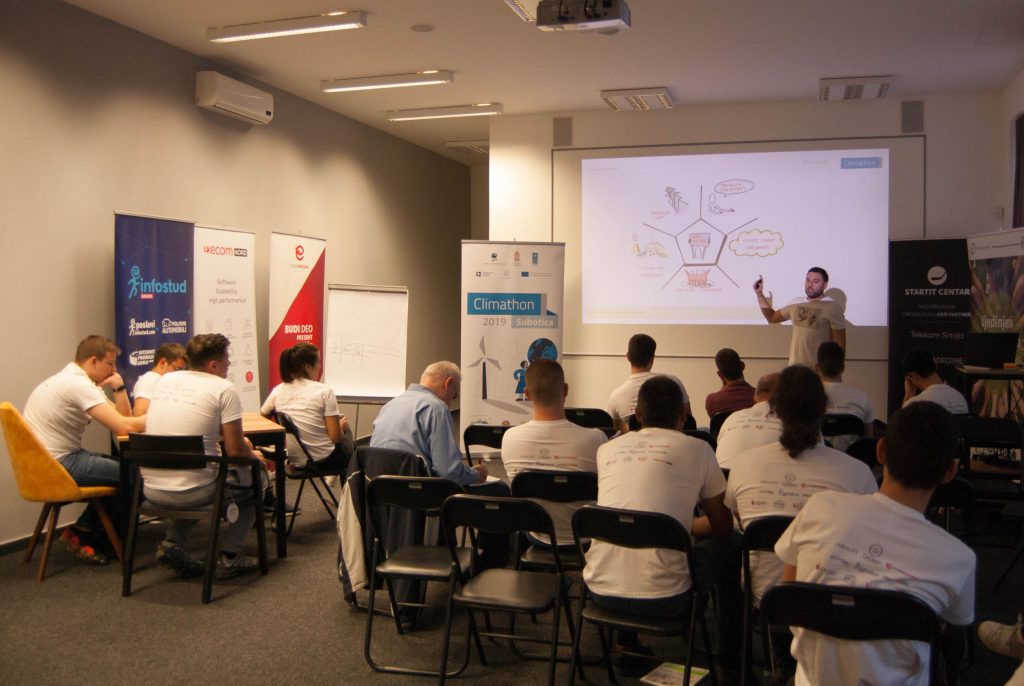
The “Gladiators” team won the second place, with a solution for two global challenges: massive logging and electronic waste. The idea is that device similar to a tablet, the “e-nout” would be rented to students at schools at a cost of around 1,000 dinars annually.
– This device would replace the notebooks because it could be written and read on, so that instead of printing books, publishers would simply transfer them to the device in a machine-readable format. Currently, one of the global problems is logging, with about 4.3 billion trees cut down annually for paper-making, and about 2,000 sheets of paper used daily in schools, and this would be an effective way to solve it – explained Stefan Bobić from “Gladiators” team.
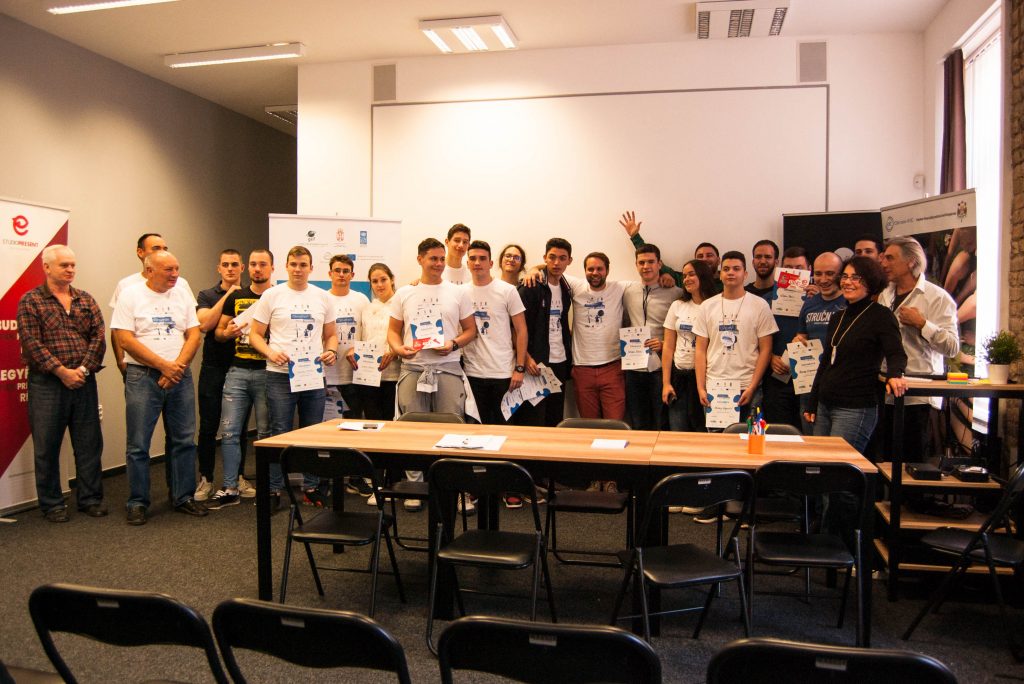
The invention of the team that won third prize is related to the recycling of electronic devices with a goal to improve the environmental awareness of citizens and environmental protection. The “Subo3ica” app enables users to gain information about where they can recycle their electronic devices, how to properly dispose electronic waste etc.
– It is an app that works on a local level, with various services available including routes of garbage trucks, placing ads for donation and reuse of appliances and similar information – said Stefan Popić, from the third-ranked team.
Other participants, though not awarded, also came up with interesting solutions and support for the realization of their ideas is in the planning. Realising their ideas would enable the reuse of glass in the production of souvenirs, the smart refrigerators that would notify users of the remaining food, while the recycled material would be used for the construction of roads.
Climathon in Čačak, themed “Green City”, was held in the Science and Technology Park. The challenge was to enrich and maintain existing green spaces in support of the fight against climate change. Question about how Čačak can be made a greener, more climate-resilient and a more pleasant city was answered by 28 participants in 7 teams.
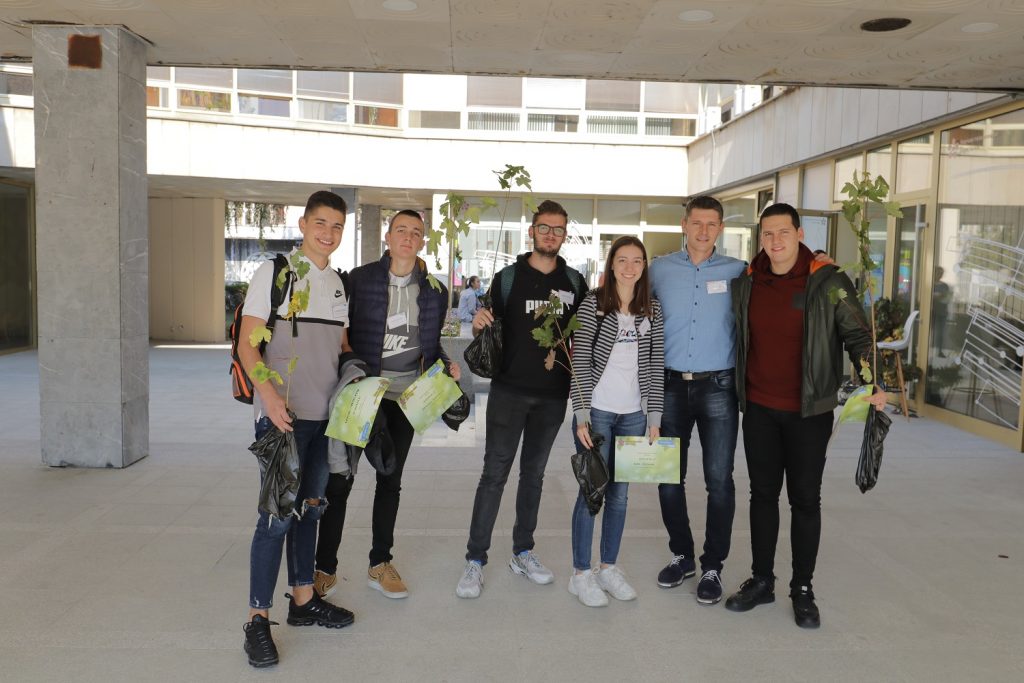
The “Čačak High School” team’s solution “Green Reading Room”won first place. Their idea is to green a part of the City Library roof and create a green reading room, a pleasant corner for the book-lovers. This new green space will improve the energy efficiency of the building and as reduce CO2 emissions and air temperatures in that part of Čačak.
The idea for the “Green Corner” – to arrange a plateau within the Cultural Center so that it fits the needs of the youth as a clean, green and healthy meeting place – by “Evergreen” team won the second place.
“Bambi” team won the third place with the “Green thread” solution, which proposes arranging terraces and neglected spaces between the House of Culture and City Hall, in order to make it greener and suitable for wedding ceremonies.
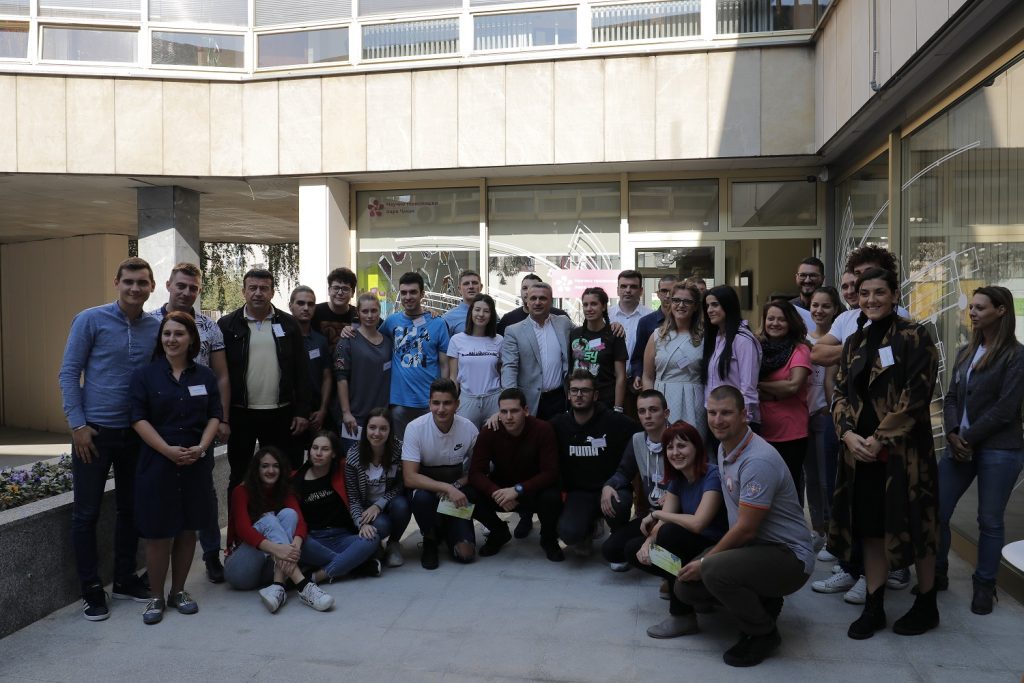
Other teams: “Energo town”, “ECoMETAr”, “Ecotopia” and “Green oasis” offered different solutions to make the city squares, streets and walls greener, and help the City of Čačak become more climate-resilient.
The Mayor of Čačak Milun Todorović announced the winners, and with the support of the State Enterprise for Forest Management “Srbijašume – the Čačak Forest Administration”, each participant received maple tree seedlings, with the obligation to plant the tree.
This year’s Climathon was also held in Belgrade, Novi Sad and Niš, as well as in more than 200 cities around the world.
Climathons in Čačak and Subotica were held within the project “Climate Smart Urban Development Challenge”, implemented by the Ministry of Environmental Protection and the United Nations Development Program (UNDP), with support of the Global Environment Facility (GEF) and in cooperation with Climate KIC Serbia.
-
Oct 23 2019 Climathon will be held in five cities of Serbia on October 25th
This year’s Climathon, a global event dedicated to address the climate challenges and involving more than 200 cities around the world, will be held on October 25th in Belgrade, Subotica, Čačak, Novi Sad and Niš. Participants organized in groups and with support of experts will be looking for sustainable solutions for climate challenges in a specific area in each city for 24 hours. The jury will select the most innovative ideas for awards.
The Climathon is established as a 24-hour festival that takes place in many cities in the form of hackathon competitions. During the competition, participants present innovative ideas and use new technologies to solve environmental and climate change problems.
The target groups of Climathon are high school students, university students, start-up community, NGOs and citizens.
Climathon in Čačak and Subotica is supported by the project “Climate Smart Urban Development Challenge” which implement Ministry of Environmental Protection with the support of the United Nations Development Program (UNDP) and the financial support of the Global Environment Facility (GEF) and by Climate KIC Serbia in Niš i Novi Sad.
-
Oct 19 2019 Climate Change Was One of the Most Important Topics of the 9th Belgrade Security Forum
The climate on Earth is changing rapidly and radically. The intensity of extreme weather events – heatwaves, forest fires, floods and droughts, have increased in the past 50 years. These occurrences have happened before, but on average once a decade, and today they occur every year or even several times a year. With the current average global temperature increase of approximately 1°C above the pre-industrial levels, it has become evident that we cannot reverse global warming during our lifetime. What we can is to stop global warming at 1.5-2 °C warmer than before pre-industrial level. These are the boundaries of what we, as a species, can adapt to. Weather conditions have already made people’s lives impossible in many places on the planet. Only in 2018, 17.2 million people have been displaced by climate-induced disasters in 148 countries and territories around the world.
The impact of climate change on security policy and economic and social development was the topic at the 9th Belgrade Security Forum, held from 16 to 18 October. At the panels “Climate Security: Adaptation, Mitigation, Change” and “Socio-economic Aspects of the Impact of Climate Change in Serbia” UNDP experts as well as experts from various fields of research and work that covers climate change discussed on the topic.
UNDP Resident Representative in Serbia Francine Pickup underlined that cities have a key role to play in fighting climate change, which is why at the recent UN Climate Change Summit in New York, leaders of states, private sector and civil society have launched numerous initiatives to transform cities into energy-efficient, inclusive and sustainable places to live. At the Summit, the youth took the front and center stage and sent a clear message that we are responsible for taking action immediately.
„More than half of the world’s population lives in cities and two-thirds will live in cities by 2050. Cities also produce more than 70 per cent of the world’s greenhouse gas emissions (GHG) and use 80 per cent of the world’s energy. They are the places where the effects of the climate emergency are already severely felt, particularly amongst the most vulnerable populations”, explained Pickup.
Serbia’s Minister of Environmental Protection Goran Trivan spoke about activities taken by Serbia to reduce GHG emissions and create climate-resilient urban communities.
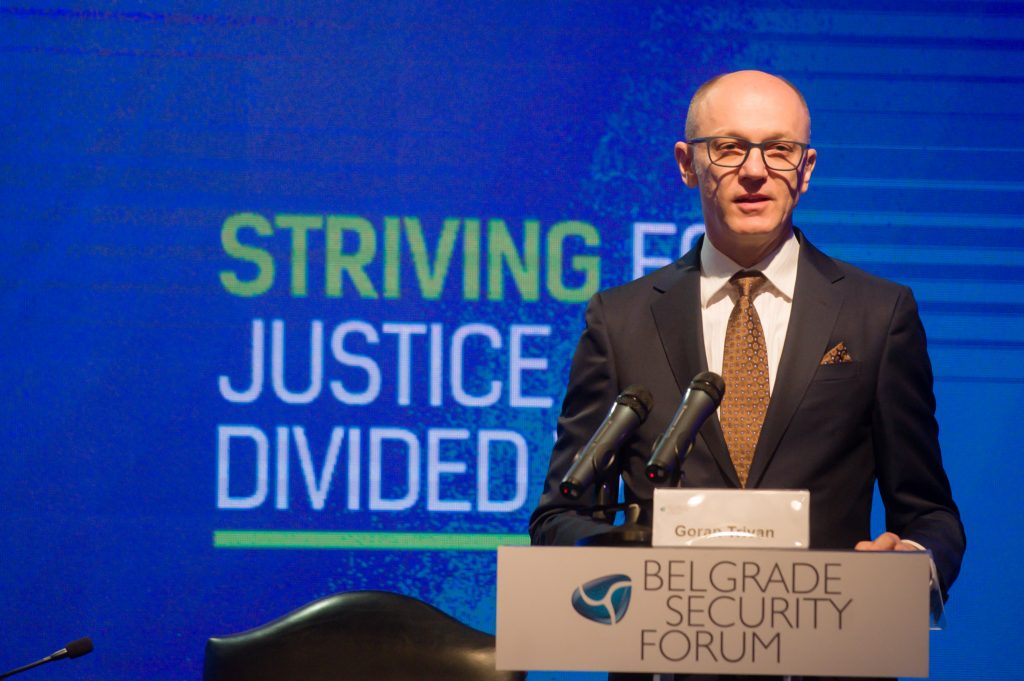
„The Ministry is working to establish an institutional, legislative and strategic framework to fight climate change. This implies the adoption of the Draft Law on Climate Change, which will serve as a basis for encouraging many activities. Also, a Draft Climate Change Strategy with an Action Plan has been prepared, which will determine the direction of low-carbon development and the path to reducing greenhouse gas emissions through specific mitigation measures. It is already evident that our ambitions to reduce GHG emissions under the Paris Climate Agreement will increase two to three times compared to 2015. In addition, as part of the revision of the Nationally Determined Contributions, Serbia will elaborate the aspect of adapting key economic sectors to the expected climate change, primarily in agriculture, water management, forests but also natural resources and public health protection“, explained Minister Trivan.
He recalled that, according to the data of the Statistical Office of the Republic of Serbia, 60 per cent of the population lives in cities in Serbia. However, this percentage will increase, as well as effects on the quality of life. Communities are expanding, but green spaces are decreasing. The number of vehicles on the streets, the amount of municipal waste and wastewaters and air pollution will increase as well as the consumption of energy for heating and cooling. All of this has the effect of increasing and intensifying the impact of climate change.
Associate Professor at the Meteorology Group at the Faculty of Physics, University of Belgrade, Vladimir Đurđević, pointed out the dangers and proportions of damage that global temperature rise of more than 2 degrees Celsius could bring.
“Our functioning on the planet depends on maintaining a stable climate. We are now outside the thermal optimum, but if we keep the temperature rise below 2 degrees, we could adapt to the changes that it brings. If we go above 2 degrees, the economy will be in a serious decline and we will trigger the so-called turning points in our climate system. A 1 degree increase in temperature has lasted for more than 100 years, while a new 1 degree increase will occur in just 30 years”.
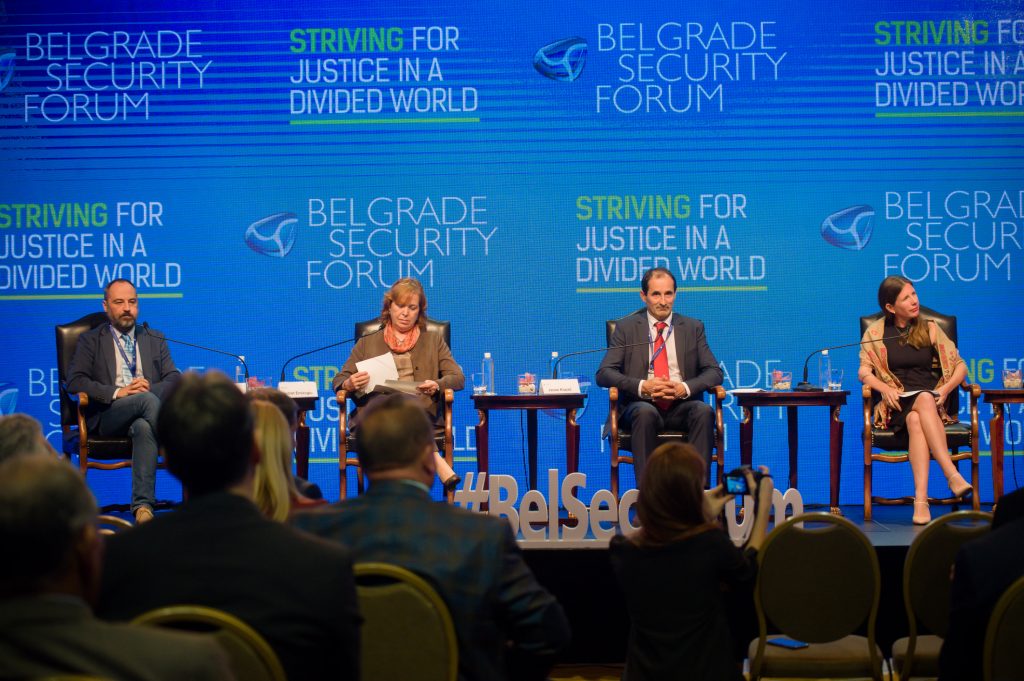
Đurđević stressed that we can expect a decrease in rainfall during the summer and therefore intense droughts. He noted that the last couple of years have seen 5 heat waves during the summer, unlike the previous decades, and that torrential city floods are much more risky because of the infrastructure that is built for stable weather.
The World Health Organization Data from shows that climate change also causes numerous health problems. Director of the Regional Office of the World Health Organization for Europe Nedret Emiroglu believes it is important to raise awareness about the impact of climate change on health and find new solutions as the intensity and frequency of communicable diseases increases.
Human health is also endangered by the coal-based energy production. Director of the Energy Community Secretariat Janez Kopač recalled that the entire Western Balkans region is significantly dependent on coal-fired power plants:
„One of the solutions would be installing filters in the power-plants, as well as introducing tax for CO2 emissions, as they do in the rest of European countries. That way air pollution and overall environmental contamination would reduce, but the problem of implementing these solutions comes down to absence of political will in the region“.
Significant initial investments are needed to strengthen the resilience to climate change, but if nothing is done – costs will only rise, said Portfolio Manager for Climate Change in UNDP Serbia, Miroslav Tadić. He recalled that Serbia has lost about six billion dollars in floods and droughts since 2000 through damage:
“For that money, we could build, for example, the necessary facilities for wastewater treatment and water supply in accordance with EU standards”.
Tadić concluded that investing in mitigation and adaptation is at the same time an opportunity for further development of the economy, new jobs and economic progress of the society.
“The consequences of climate change will be there, no matter if we approve or disapprove of its existence. Residents of urban and rural areas will be equally threatened by the effects of climate change, only in different ways”, said climate change expert in Serbia Danijela Božanić.

The panellists noticed that Serbia has signed and ratified vital agreements on climate change and climate protection, but that there is no adequate implementation of these agreements in practice. Experts agreed that waste management, recycling and investment in scientific research, combined with joint regional and international efforts, should be the key priorities.
The panel “Climate Security: Adaptation, Mitigation, Change” was supported by the United Nations Development Program (UNDP) and participated by UNDP Resident Representative in Serbia Fransine Pickup, Minister for the Environmental Protection Goran Trivan, Associate Professor in the Meteorology Group at the Faculty of Physics University in Belgrade Vladimir Đurđević, Director of the World Health Organization (WHO) Regional Office for Europe Nedret Emiroglu and Director of the Energy Community Secretariat Janez Kopač.
The panel “Socio-economic Aspects of Climate Change Impact in Serbia”, also held in partnership with UNDP, was participated by UNDP Climate Change Portfolio Manager Miroslav Tadić, Faculty of Mechanical Engineering at University of Belgrade Aleksandar Jovović, Associate Professor in the Meteorology Group of the Faculty of Physics at University of Belgrade Vladimir Đurđjević, Climate Change expert Danijela Božanić and Team Leader on Resilient Development in UNDP Serbia Žarko Petrović.
-
Oct 11 2019 Cities are crucial for the fight against climate change
Best practices and solutions for development of climate-smart cities across Europe were presented today at the event „Citizens Build Smart Cities“ in Belgrade, organized by the Ministry of Environmental Protection and the United Nations Development Program (UNDP), with support from the Global Environment Facility (GEF) ), in partnership with Adria Media Group.
The event was opened by Minister of Environmental Protection Goran Trivan, Head of the Sector for Cooperation of the Delegation of the European Union to Serbia Yngve Engstrom and UNDP Resident Representative to Serbia Francine Pickup.
Ms. Pickup emphasized that cities have a key role to play to the fight climate change, which is why at the recent UN Climate Change Summit in New York, leaders of states, private sector and civil society have launched numerous initiatives to transform cities into energy-efficient, inclusive and sustainable places to live. At the Summit, the youth took the keynote and sent a message saying that we are responsible for taking action immediately.
„More than half of the world’s population lives in cities and two-thirds will live in cities by 2050. Cities also produce more than 70 per cent of the world’s greenhouse gases emissions and use 80 per cent of the world’s energy. They are the places where the effects of the climate emergency are already severely felt, particularly amongst the most vulnerable population“, explained Pickup.
She recalled a joint initiative of the Ministry of the Environmental Protection and the UNDP, which with the support of the Global Environment Facility, supports innovative solutions to reduce the emissions of GHG in Serbia:
„UNDP works with the national and local governments to translate global and national climate goals into concrete actions. The Ministry and UNDP awarded the five most advanced solutions which implementation will cut around 500.000 tons of CO2 for Serbia, which equals planting trees on a territory of 145 football fields. These five innovative technological solutions and business models will also increase the use of renewables, improve resource and energy efficiency, tackle urban food waste and build smart city infrastructure“, said Pickup.
Serbia’s Minister of Environmental protection Goran Trivan spoke about activities taken by Serbia to reduce GHG emissions and create climate-resilient urban communities.
„The Ministry is working to establish an institutional, legislative and strategic framework to fight climate change. This implies the adoption of the Draft Law on Climate Change, which will serve as a basis for encouraging many activities. Also, a Draft Climate Change Strategy with an Action Plan has been prepared, which will determine the direction of low-carbon development and the path to reducing greenhouse gas emissions through specific mitigation measures. It is already evident that our ambitions to reduce GHG emissions under the Paris Climate Agreement will increase two to three times compared to 2015. In addition, as part of the revision of the Nationally Determined Contributions, Serbia will elaborate the aspect of adapting key economic sectors to the expected climate change, primarily in agriculture, water management, forests but also natural resources and public health protection“, explained Minister Trivan.
He reminded that, according to the data of the Statistical Office of the Republic of Serbia, 60.8 per cent of the population lives in cities in Serbia. However, this percentage will increase, as well as effects on the quality of life. Communities are expanding, but green spaces are decreasing. The number of vehicles on the streets, the amount of municipal waste and wastewaters and air pollution will increase as well as the consumption of energy for heating and cooling. All of this has the effect of increasing greenhouse gas emissions and intensifying the impact of climate change.
„The population of cities is demographically younger than in the other settlements, which makes it a driving force that we must count on to develop in the future. Younger generations are using modern technology from a very young age. And their innovative usage has proven to be crucial for greater engagement in developing climate-resilient cities“, concluded Trivan.
By the end of the year, a new European Green Deal will be presented. The goal is to increase EU 2030 GHG emission reduction target towards 55 % up from the 40% currently agreed, announced Head of the Sector for Cooperation of the Delegation of the European Union to Serbia Yngve Engstrom.
„The measures we will take within this Deal will be aimed at protecting biodiversity, reducing pollution and GHG emissions, strengthening the circular economy and tax measures consistent with these measures. The EU donated € 400 million so far for environmental protection in Serbia. We support the alignment of legislation with the EU, as well as development of a new Climate Law and Climate Strategy, which should be adopted by the end of the year“, said Engstrom.
Experts from Italy, Bulgaria, Finland, Northern Macedonia and via live streaming from London, Maribor, Milan, Helsinki, Madrid have presented the concrete measures to fight climate change and to develop sustainable cities. Throughout the Panels, more than 100 participants had the opportunity to hear experts’ experiences on innovative approaches, technical solutions, new technologies, open data, circular economy and development strategies that will contribute to the creation of climate-smart and sustainable cities and municipalities. Representatives of public and private companies presented the realized infrastructure solutions for the development of smart cities
Within this event, workshops were held on the topic of open data and an alternative way of financing projects, while the Fair of Ideas, Technologies and Business was held at Manjež Park.
The event was organized as part of a five-year “Climate Smart Urban Development Challenge” project, which contributes to making local communities and cities in Serbia more resilient to climate change through the development of projects to reduce greenhouse gas emissions through partnerships between the public, private and civil sectors. The Ministry of Environmental Protection implements the project with the support of the United Nations Development Program (UNDP) and the financial support of the Global Environment Facility (GEF). The project partners are the Delegation of the European Union to the Republic of Serbia, the Government of the Kingdom of Sweden, the Government of Switzerland, Innovation Fund and the Standing Conference of Cities and Municipalities.
